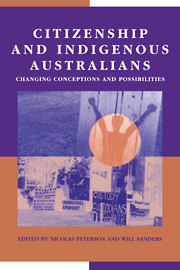Book contents
- Frontmatter
- Contents
- Contributors
- Preface
- Abbreviations
- 1 Introduction
- Part I Historical Conceptions
- Part II Contemporary Conceptions
- Part III Emerging Possibilities
- 9 Whose Citizens? Whose Country?
- 10 Citizenship and Legitimacy in Post-colonial Australia
- 11 The International Law Context
- 12 Sovereignty
- Index
10 - Citizenship and Legitimacy in Post-colonial Australia
from Part III - Emerging Possibilities
Published online by Cambridge University Press: 23 September 2009
- Frontmatter
- Contents
- Contributors
- Preface
- Abbreviations
- 1 Introduction
- Part I Historical Conceptions
- Part II Contemporary Conceptions
- Part III Emerging Possibilities
- 9 Whose Citizens? Whose Country?
- 10 Citizenship and Legitimacy in Post-colonial Australia
- 11 The International Law Context
- 12 Sovereignty
- Index
Summary
Effective citizenship, even among people of diverse interests and values, requires a shared sense of political community, including allegiance to common legal and political institutions and general acceptance of each other's legitimate membership of the community and right to citizenship. In most democratic countries, issues of legitimacy are relatively insignificant, provided the borders are well established and the basic constitutional rules uncontested. In some democracies, however, particularly former settler societies such as Australia, New Zealand, the United States and Canada, the legitimacy of the regime and therefore the legitimacy of its citizens have been called into question. The assumptions that underlay colonial settlement, including the supposed civilising mission and ethnic superiority of Europeans, have been discredited. With this discrediting has come the realisation that the regimes of the settlers were imposed on the indigenous peoples by force and with callous disregard for their cultures and rights. For the indigenous minorities themselves, there is little reason to owe allegiance to a legal and political system to which they have never consented and by which they continue to be dispossessed. While the legitimacy of their residence in the country is beyond doubt, they must question the legitimacy of the imposed regime and the citizenship it confers. Like other colonised peoples, they are seeking restoration of the rights lost through colonisation, particularly the right to their lands and the right to political self-determination.
For the settler and migrant majorities, at the same time, the shift in values can be disturbing.
- Type
- Chapter
- Information
- Citizenship and Indigenous AustraliansChanging Conceptions and Possibilities, pp. 179 - 195Publisher: Cambridge University PressPrint publication year: 1998
- 7
- Cited by

